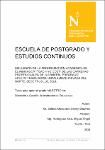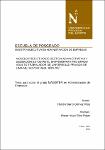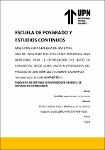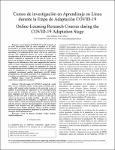| dc.contributor.advisor | Rodríguez Alza, Miguel Ángel | |
| dc.contributor.author | Zelada Mosquera, Danny Stephan | |
| dc.date.accessioned | 2020-08-11T22:40:11Z | |
| dc.date.available | 2020-08-11T22:40:11Z | |
| dc.date.issued | 2020-06-02 | |
| dc.identifier.citation | Zelada, D. S. (2018). Influencia de la programación académica en el indicador Teaching Cost de las carreras profesionales de ingeniería, pregrado adulto trabajador, Universidad Privada del Norte, sede Trujillo, 2018 (Tesis de maestría). Repositorio de la Universidad Privada del Norte. Recuperado de http://hdl.handle.net/11537/24089 | es_PE |
| dc.identifier.other | 378 ZELA 2018 | es_PE |
| dc.identifier.uri | https://hdl.handle.net/11537/24089 | |
| dc.description.abstract | La presente investigación pretende determinar la influencia de la programación académica, un proceso principal, dentro de la Política de Calidad, en el indicador de gestión "teaching cost" de las carreras profesionales de Ingeniería, Pregrado Adulto Trabajador (PGAT), Universidad Privada del Norte, sede Trujillo, 2018.
El indicador “teaching cost” mide el ratio del total de horas programadas a los docentes, durante una semana entre el número de estudiantes matriculados que reciben el servicio académico en el tiempo calculado, y se crea para gestionar de manera eficiente y eficaz las etapas de planificación y desarrollo de los procesos de programación académica y de matrícula o enrollment.
Se analiza la correlación y regresión del número total de horas semanales programadas y el “teaching cost” de las tres carreras de Ingeniería, Ingeniería Industrial, Ingeniería Civil e Ingeniería de Minas, pertenecientes al programa Pregrado Adulto Trabajador, a través de un cálculo integral, además de un cálculo particular, por cursos transversales de los departamentos de Ciencias y Humanidades, por cursos especializados de cada carrera y cursos virtuales de todas las carreras, de acuerdo al diseño modular (2 módulos) de programación académica, se reportan y discuten tablas y gráficos presentados para cada análisis. Se analiza los impactos financieros de la fluctuación del “teaching cost”. Se evalúa también, la correlación y regresión del número total de horas semanales programadas y el enrollment particular por cada ítem señalado anteriormente.
Se observa en los resultados de la investigación que la programación académica del semestre 2018-5 de las carreras de Ingeniería, pregrado adulto trabajador, produce un “teaching cost” de 0,554, valor que se encuentra dentro del rango solicitado (menor a 0,65 como indicador estratégico del proceso). Además, se observa que los cursos presenciales especializados de la carrera de Ingeniería de Minas elevan el ratio hasta un valor promedio de 0,654, los cursos de los departamentos académicos de Ciencias y Humanidades, así como los cursos presenciales especializados de las carreras de Ingeniería Industrial e Ingeniería Civil se encargan de equilibrar el ratio, por brindar valores dentro del rango esperado y los cursos virtuales de todas las carreras producen el “teaching cost” más bajo, con un valor de 0,159.
Para el análisis del número total de horas semanales programadas y “teaching cost”, el coeficiente de correlación lineal, R2, es 0,1232, entonces se concluye que no existe una correlación lineal significativa entre las horas semanales programadas y el “teaching cost”. Los pares de datos agrupados correspondientes al análisis de los cursos virtuales y los cursos especializados presenciales de la carrera de Ingeniería de Minas, producen una alta dispersión y un alto valor en sus residuales, impactando en el valor del coeficiente de correlación lineal. El modelo de regresión lineal es y = 0,0003x + 0,3321.
Para el análisis del enrollment por ítem y el número total de horas semanales programadas, el coeficiente de correlación lineal, R2, es 0,9569, entonces se concluye que el 95,69% de horas semanales programadas se sustentan en el enrollment. La ecuación de regresión lineal obtenida es y= 0,3093x + 3,7821, donde 0,3093 es la pendiente de la recta de regresión obtenida y representa el indicador “teaching cost”, el cual implica que, por cada estudiante adicional registrado en la matrícula del semestre, el número de horas programadas a la semana aumenta en 0,3093.
Se brindan un conjunto de recomendaciones a través de factores o acciones en el proceso de programación académica que permiten optimizar el “teaching cost”. | es_PE |
| dc.description.abstract | This research aims to determine the influence of academic programming, a main process, within the Quality Policy, in the management indicator "teaching cost" of professional careers in Engineering, Undergraduate Adult Worker, Universidad Privada del Norte, Trujillo headquarters, 2018.
The "teaching cost" indicator measures the ratio of the total number of hours programmed to the teachers, during a week between the number of students enrolled who receive the academic service in the calculated time, and is created to efficiently and effectively manage the stages of planning and development of academic programming processes and enrollment.
The correlation and regression of the total number of weekly hours programmed and the "teaching cost" of the three careers of Engineering, Industrial Engineering, Civil Engineering and Mining Engineering, belonging to the Undergraduate Adult Worker program, through a comprehensive calculation, are analyzed, in addition to a particular calculation, by transversal courses of the departments of Sciences and Humanities, by specialized courses of each career and virtual courses of all the careers, according to the modular design (2 modules) of academic programming, tables and reports are discussed and graphics presented for each analysis. The financial impacts of the "teaching cost" fluctuation are analyzed. It also evaluates the correlation and regression of the total number of weekly hours programmed and the particular enrollment for each item indicated above.
It is observed in the results of the research that the academic programming of the semester 2018-5 of the careers of Engineering, undergraduate adult worker, produces a "teaching cost" of 0.554, value that is within the requested range (less than 0.65 as a strategic indicator of the process). In addition, it is observed that the specialized face-to-face courses of the Mining Engineering career raise the ratio to an average value of 0.654, the courses of the academic departments of Sciences and Humanities, as well as the specialized face-to-face courses of the Industrial Engineering courses and Civil Engineering are responsible for balancing the ratio, for providing values within the expected range and the virtual courses of all careers produce the lowest "teaching cost", with a value of 0.159.
For the analysis of the total number of programmed weekly hours and "teaching cost", the linear correlation coefficient, R2, is 0.1232, so it is concluded that there is no significant linear correlation between the weekly hours programmed and the "teaching cost" . The pairs of grouped data corresponding to the analysis of the virtual courses and the specialized face-to-face courses of the Mining Engineering career, produce a high dispersion and a high value in their residuals, impacting on the value of the linear correlation coefficient. The linear regression model is y = 0.0003x + 0.3321.
For the analysis of enrollment by item and the total number of weekly hours programmed, the linear correlation coefficient, R2, is 0.9569, then it is concluded that 95.69% of programmed weekly hours are based on enrollment. The linear regression equation obtained is y = 0.3093x + 3.7821, where 0.3093 is the slope of the regression line obtained and represents the "teaching cost" indicator, which implies that, for each additional student registered in the enrollment of the semester, the number of hours scheduled per week increases by 0.3093.
A set of recommendations are provided through factors or actions in the academic programming process that allow to optimize the "teaching cost". | es_PE |
| dc.description.uri | Tesis | es_PE |
| dc.format | application/pdf | es_PE |
| dc.format | application/msword | es_PE |
| dc.language.iso | spa | es_PE |
| dc.publisher | Universidad Privada del Norte | es_PE |
| dc.rights | info:eu-repo/semantics/openAccess | es_PE |
| dc.rights | Atribución-NoComercial-CompartirIgual 3.0 Estados Unidos de América | * |
| dc.rights.uri | https://creativecommons.org/licenses/by-nc-sa/3.0/us/ | * |
| dc.source | Universidad Privada del Norte | es_PE |
| dc.source | Repositorio Institucional - UPN | es_PE |
| dc.subject | Investigación de la enseñanza | es_PE |
| dc.subject | Calidad de la educación | es_PE |
| dc.subject | Planificación de la educación | es_PE |
| dc.title | Influencia de la programación académica en el indicador Teaching Cost de las carreras profesionales de ingeniería, pregrado adulto trabajador, Universidad Privada del Norte, sede Trujillo, 2018 | es_PE |
| dc.type | info:eu-repo/semantics/masterThesis | es_PE |
| thesis.degree.grantor | Universidad Privada del Norte. Escuela de Posgrado y Estudios Continuos | es_PE |
| thesis.degree.level | Maestría | es_PE |
| thesis.degree.discipline | Maestría en Dirección y Gestión de Instituciones Educativas | es_PE |
| thesis.degree.name | Maestro en Dirección y Gestión de Instituciones Educativas | es_PE |
| dc.publisher.country | PE | es_PE |
| dc.subject.ocde | https://purl.org/pe-repo/ocde/ford#5.03.00 | es_PE |
| thesis.degree.program | Posgrado | es_PE |
| dc.description.sede | Trujillo El Molino | es_PE |
| renati.advisor.dni | 18081624 | |
| renati.advisor.orcid | https://orcid.org/0000-0002-1939-5343 | es_PE |
| renati.author.dni | 18073709 | |
| renati.discipline | 191277 | es_PE |
| renati.juror | Rengifo Contreras, Víctor Gregorio | |
| renati.juror | Rodríguez Pajares, Carmen Olga | |
| renati.juror | Mantilla Correa, Willy Roberto | |
| renati.level | https://purl.org/pe-repo/renati/level#maestro | es_PE |
| renati.type | https://purl.org/pe-repo/renati/type#tesis | es_PE |








